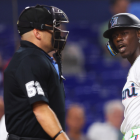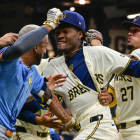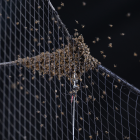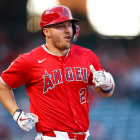HOUSTON -- The first World Series victory in Astros history was complete madness, a thrill ride that broke multiple records, and sent Dodger Stadium into fits of ecstasy and agony, all within minutes of each other. The second World Series victory was over by the second inning, because one of the most dominant pitchers in the world suddenly threw a bunch of meatballs.
The Astros beat the Dodgers 5-3 to win Game 3 of the World Series, jumping to a 2-1 series lead. Their complete annihilation of Yu Darvish made it happen.
The right-hander had been postseason gold for L.A., allowing just two runs over two starts (one each in the NLDS and NLCS), while punching out 14 batters in 11 1/3 innings. Only this time, a second-inning nightmare did him in. A visit from our ace pitching correspondent Nick Pollack of PitcherList.com underscores the night's pitching problems.
Darvish's first problem was that his fastball was terrible. At first, he got away with it. After falling behind 3-1 against Astros leadoff hitter George Springer, Darvish fired a heater. It didn't go well. The pitch came in at 95 mph, loitered in the middle of the zone with little movement ... and got belted to right-center for a leadoff double.
Darvish wiggled out of the jam, after knifing through Alex Bregman, Jose Altuve, and Carlos Correa with two groundouts and a flyout.
He found no such luck the next inning. Austin Barnes called for a 2-1 pitch at the knees against Astros first baseman Yuli Gurriel, only to watch another 95-mph fastball float to belt-high level. Gurriel walloped it, his line drive sailing deep into the Crawford Boxes in left, leaving the yard in about 0.000001 seconds.
Darvish's fastball was so bad, it could have resulted in even more damage, if not for a smattering of luck. Watch the location on this 95-mph wounded duck against Evan Gattis: target low and outside, pitch up and inside edge, and Gattis simply missed a golden opportunity to smash it.
The two pitches the versatile Darvish throws most often are that fastball, and his slider. In his five big league seasons, Darvish has limited opponents to microscopic batting averages of .122, .166, .152, .148, and .166 against his slider. But that pitch can only truly thrive if Darvish can keep hitters honest with other offerings, particularly his heater. When the fastball's got nothing, the slider's not likely to succeed. And when the slider flutters to places it shouldn't go, everything goes to hell.
That's what happened later in the second. Facing Game 2 ninth-inning hero Marwin Gonzalez with two on and none out, Darvish tossed a 1-1 slider that was a thing of beauty, the pitch burrowing beneath Gonzalez's bat (on a bunt attempt, of all things) for a badly needed strike. But on the very next pitch, Darvish again got nowhere near his catcher's low target, instead hanging a pitch at the top of the zone that Gonzalez ripped off the wall in left-center to score Houston's second run.
Compare that offering to this hunk of filth that Darvish fired against Diamondbacks masher Paul Goldschmidt earlier this season, then ask yourself how those two efforts could be classified as the same pitch.
Darvish met his doom by ignoring the three musts of real-estate speculation: location, location, location. A pitcher who normally excels low and away (especially against right-handed hitters) instead lingered far too long in the up-and-over-the-middle neighborhood. When Darvish tried to eschew his fastball and slider for some cutter relief, that location bugaboo continued to hurt him. This 88-mph cutter was a glorified batting-practice fastball, limping to a middle-in spot that let Altuve feast; if not for Kenta Maeda's cleanup job, Darvish might've ended his night with a six-spot on his ledger.
The damage for Darvish? 1 2/3 innings, four runs, six hits, one walk, a homer, and a trip to the showers after just 49 pitches; just one swinging strike in 49 pitches, following a much healthier 12.3 percent swinging-strike rate during the 2017 regular season; the shortest start of his career (regular season or playoffs); and just the 14th time in a franchise history that goes back to the 19th century that a Dodgers starter lasted just 1 2/3 innings (or fewer) in a postseason game.
Credit the Astros for extending their home-field dominance in the playoffs, with their current run yielding a 36-10 advantage in runs scored at Minute Maid Park. Credit Lance McCullers Jr. for going from ace reliever in Game 7 of the ALCS to notching 5 1/3 innings that were far from perfect, but still good enough on a night when the offense showed up early. Credit Brad Peacock for pitching the game of his life, with 3 2/3 scoreless, hitless innings that enabled A.J. Hinch to avoid the Byung-Hyun Kim scenario of a very good closer who now terrifies everyone in the ballpark every time he sniffs a late-inning relief appearances.
But the bottom line on this night was that the playoffs are often a crapshoot. Carry whatever on-paper advantage you want into a playoff game, even when it's a top-of-the-rotation starter going up against a talented but unpredictable pitcher who'd made it through five innings just three times in his past 10 appearances dating back to the tail end of the regular season. Stars can fail anytime, and unheralded heroes emerge all the time.
Fully rested and riding a blazing hot streak, Yu Darvish laid a colossal egg. Coming off ALDS and ALCS performances in which he surrendered five runs and nine hits over five atrocious innings, Peacock suddenly pitched like Madison Bumgarner and Mariano Rivera had a beautiful playoff baby. And the Astros are now two wins away from their first World Series triumph in their 56 seasons of existence.






















